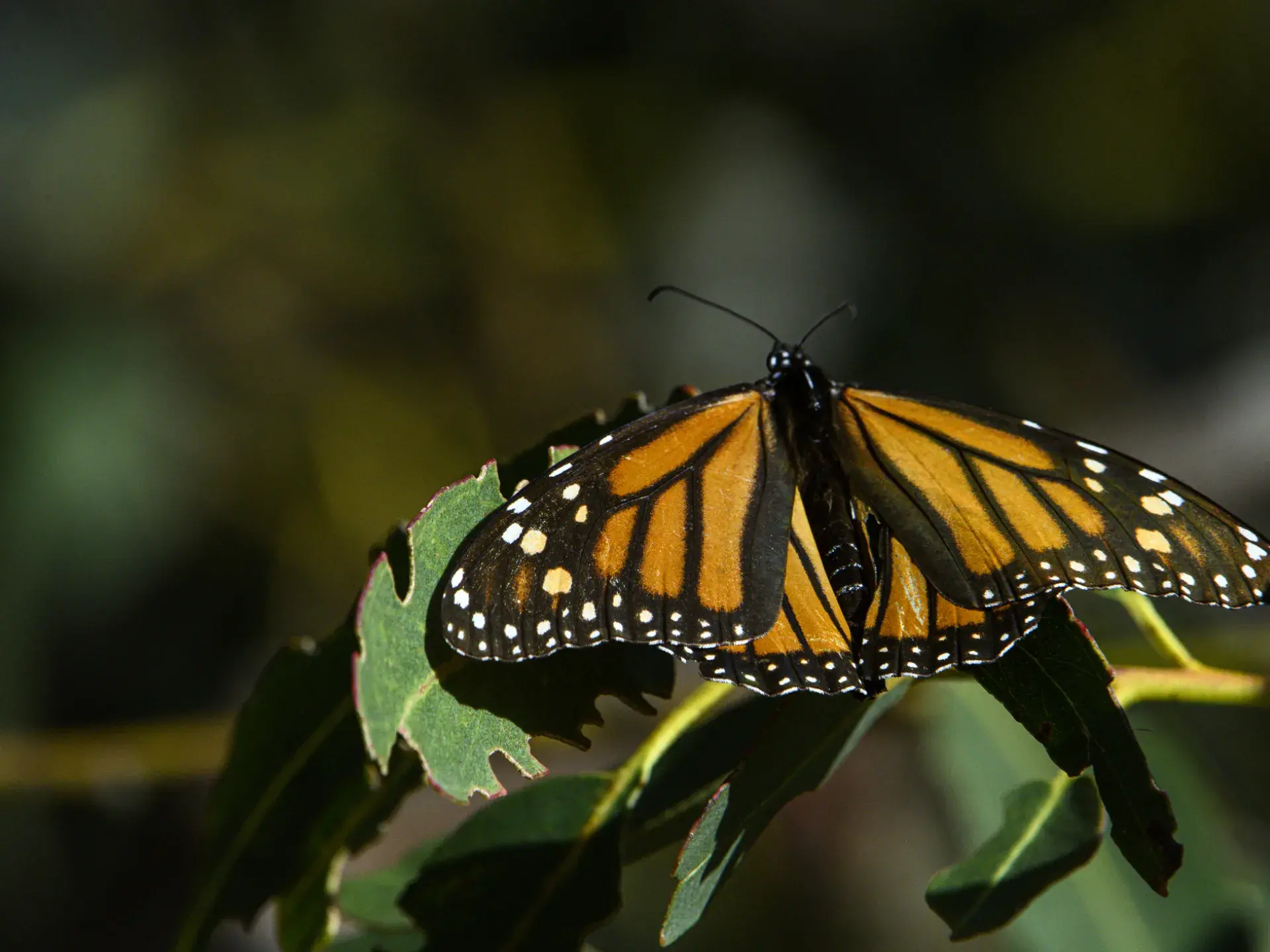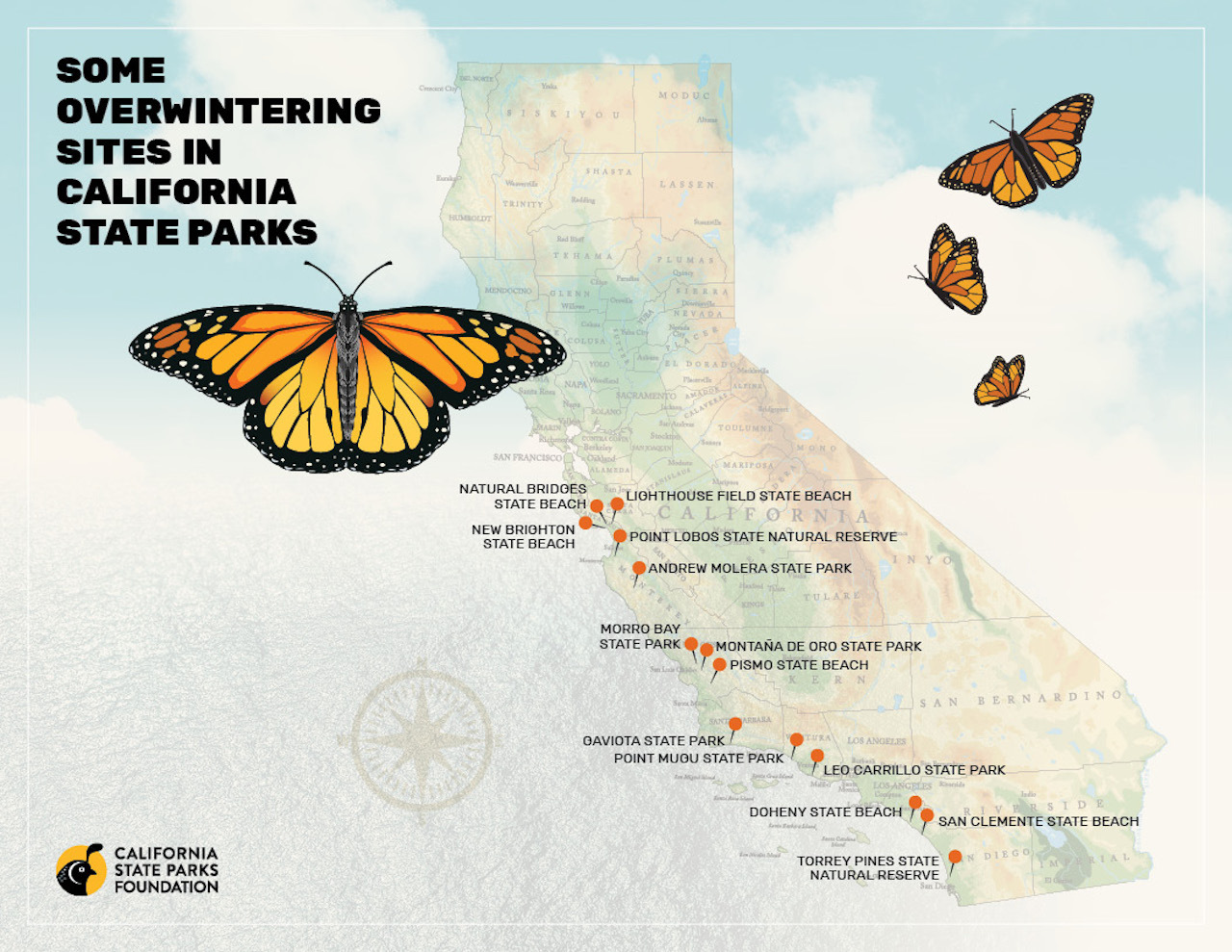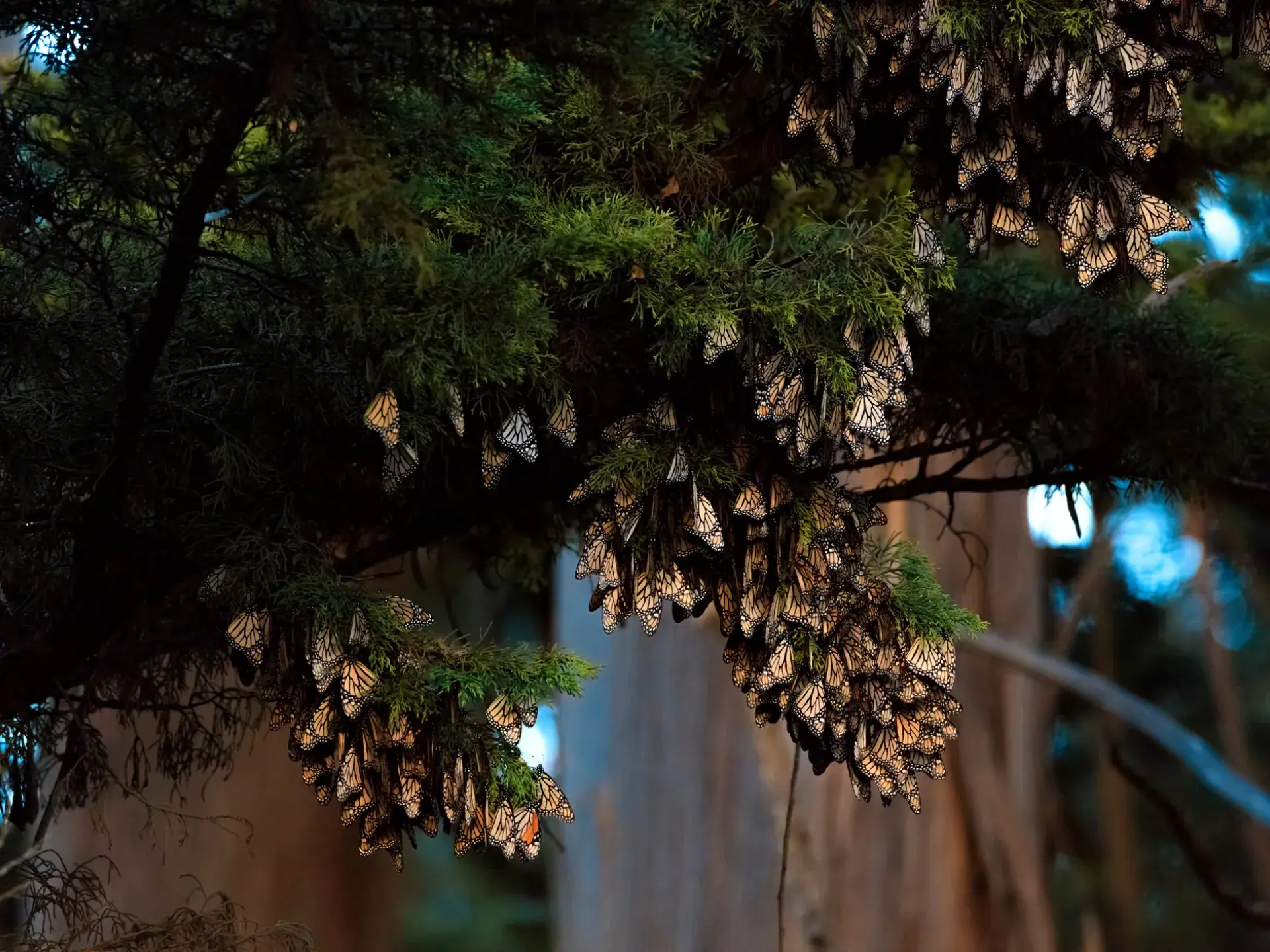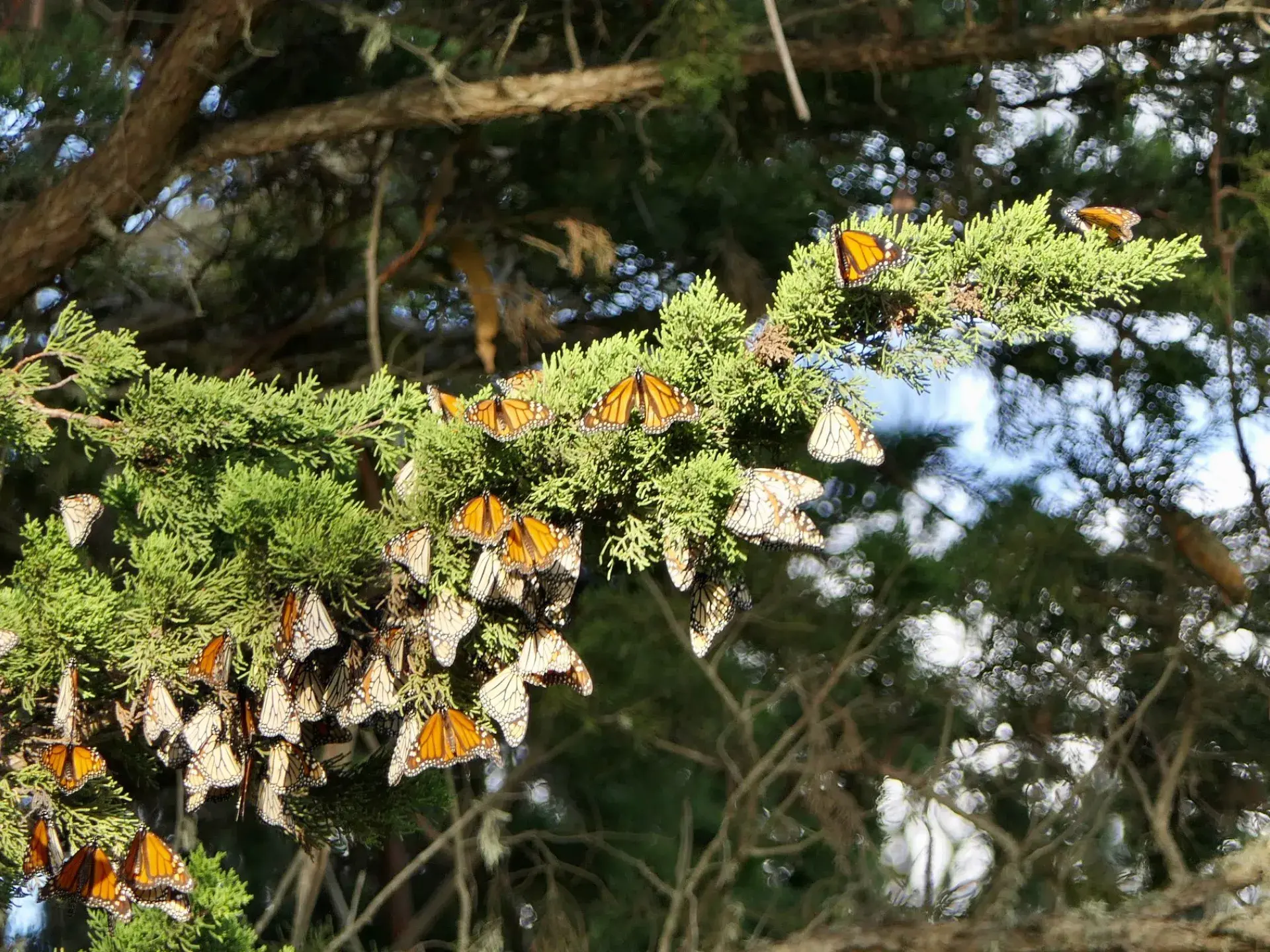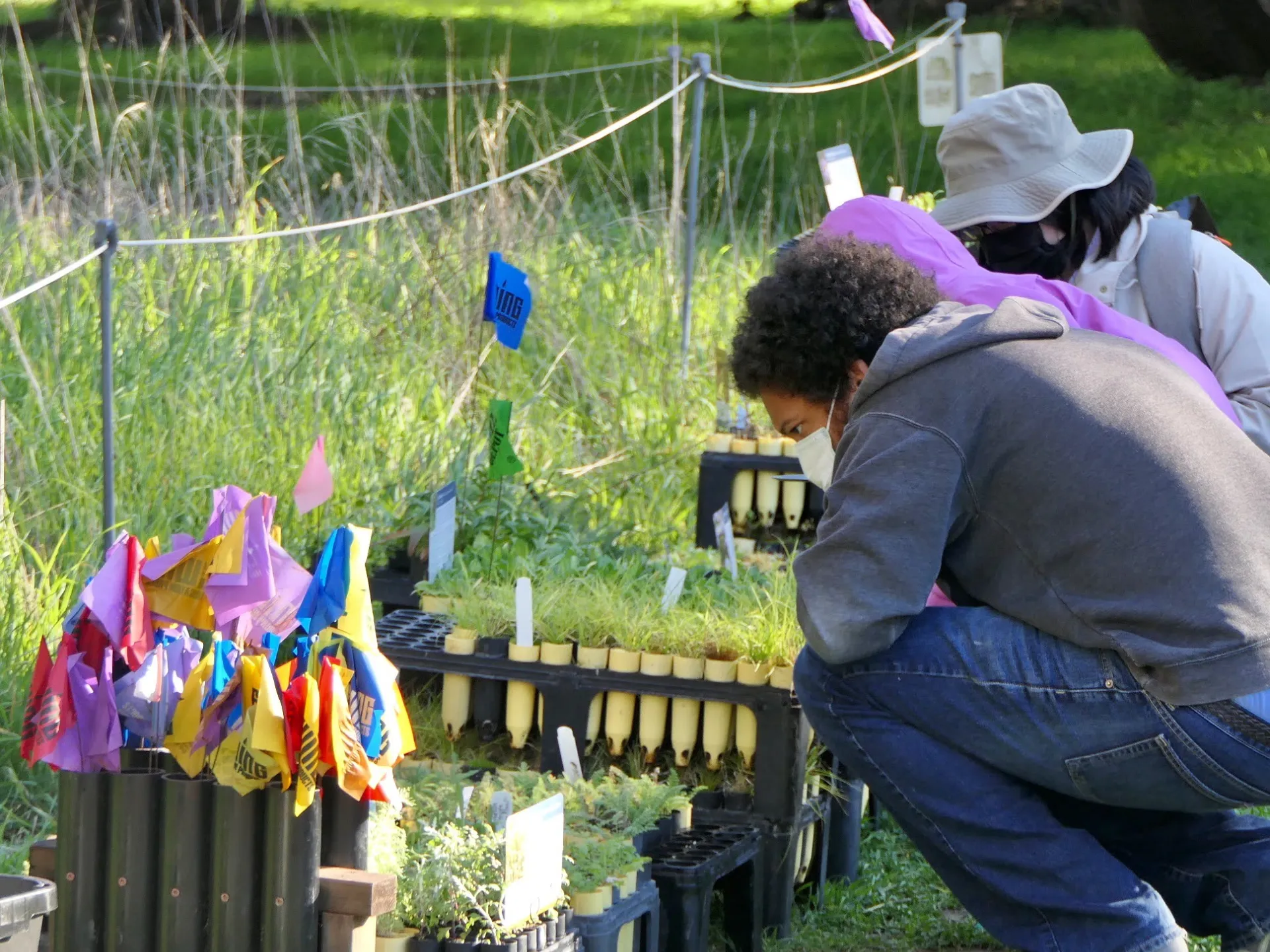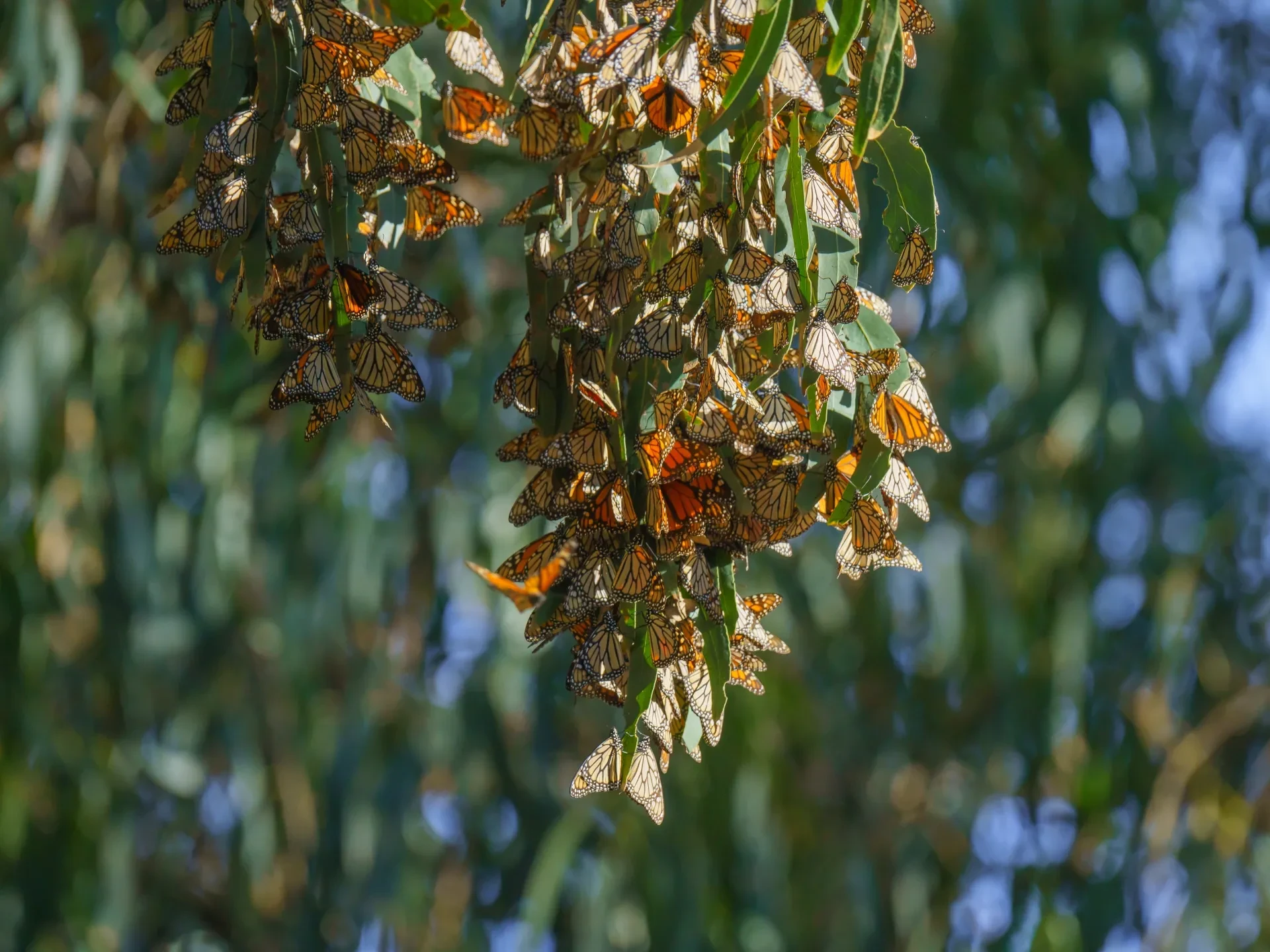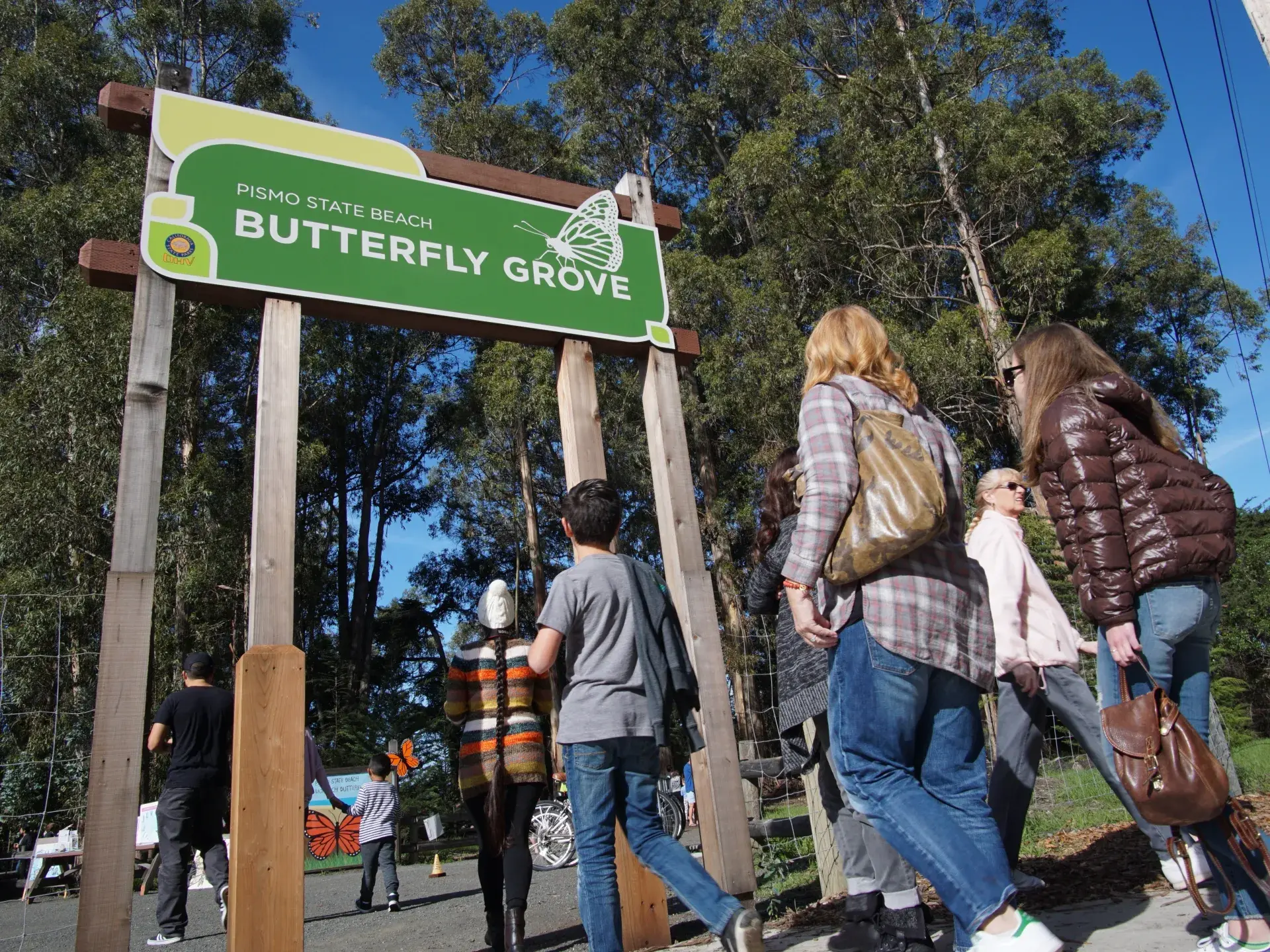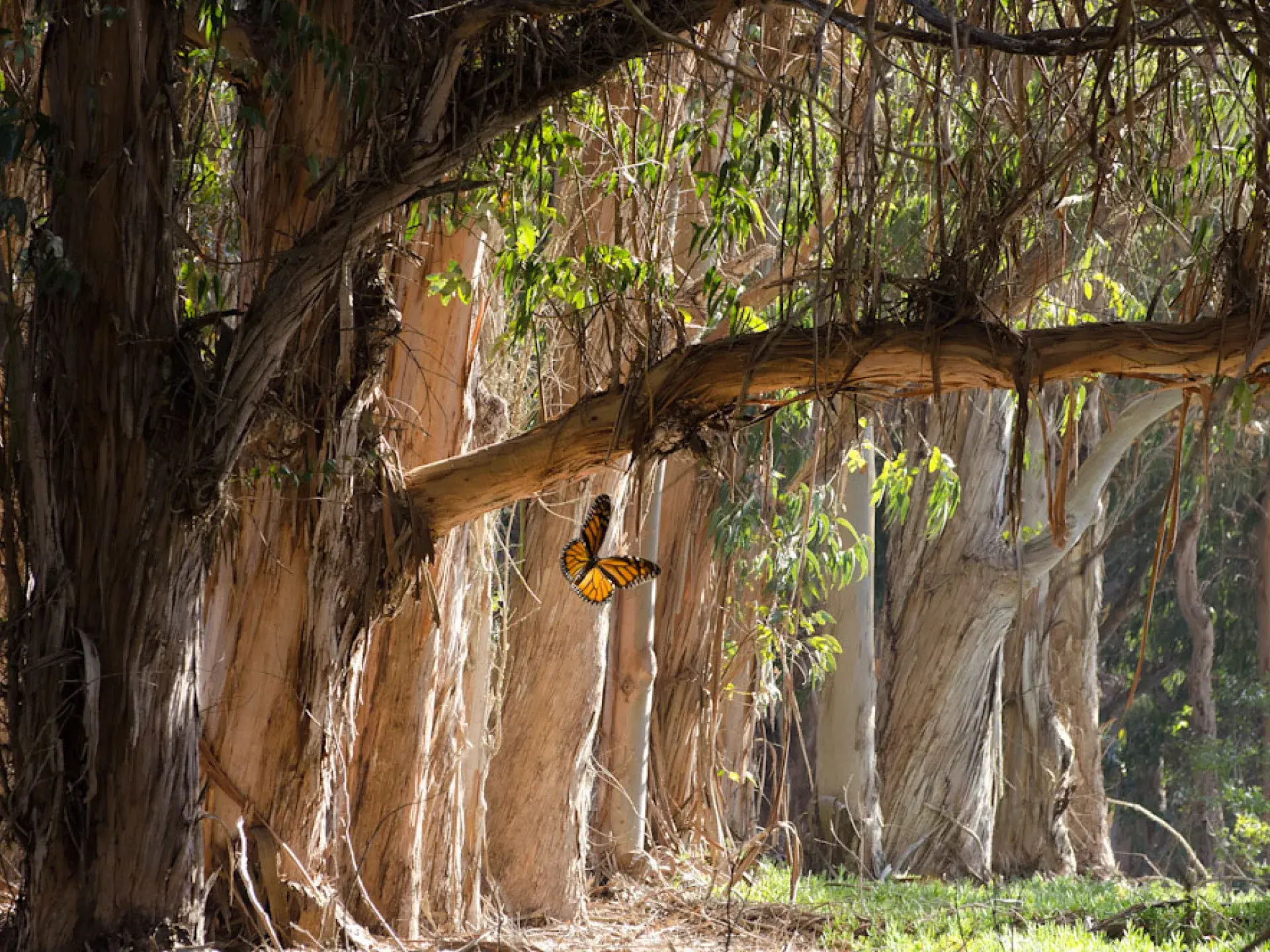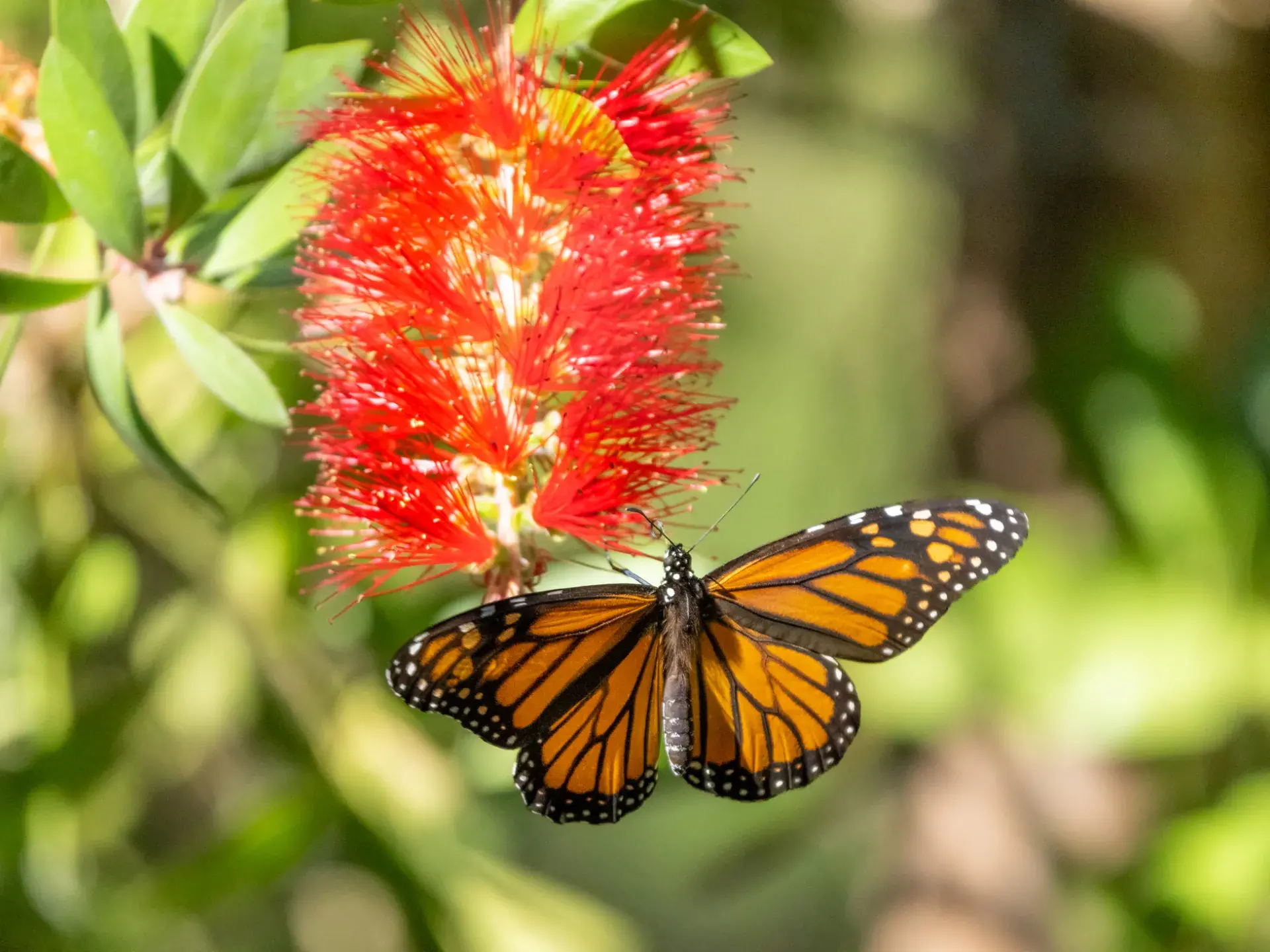California is home to many natural wonders. One of the state's most magical natural phenomena is the annual migration of western monarch butterflies from October until February. With a significant amount of overwintering habitat located in California's state parks, we've compiled a few of the best state parks for you to visit and experience this iconic species.
About Western Monarchs and their Habitat:
The western monarch butterfly (Danaus plexippus) is a subspecies of the monarch butterfly that is found west of the Rocky Mountains. Unlike their eastern counterparts, who migrate from Canada and the northern United States to Mexico for the winter, western monarchs migrate from the western United States and Canada to California and take refuge at sites along the coast, a process known as overwintering.
Overwintering is a vital phase in a monarch butterfly's life cycle, offering a specialized microclimate for rest and energy conservation before spring mating and northward migration. However, the western monarch population has sharply declined over the last two decades due to habitat loss, pesticide use, natural predators, disease, and climate change. Preserving and restoring these overwintering sites is critical for their survival.
Here is a list of a few of our favorite monarch groves at a California state park:
Natural Bridges State Beach (map)
The monarch grove at Natural Bridges State Beach in Santa Cruz is a world-renowned overwintering haven for the species, and the only State Monarch Preserve in California (source).
Each year, the park's blue gum eucalyptus trees come alive with hundreds of vibrant orange and black monarchs that cluster in large groups to share warmth. In 2022, Natural Bridges State Beach hosted 2.2% of the total western monarch population, the second-highest percentage in a state park (the first highest being Pismo State Beach at 7.2%).
Natural Bridges State Beach serves as more than just a winter sanctuary; it's also an invaluable educational resource! The grove’s informational signage and events like Welcome Back Monarchs Day on October 8th, 2023, are unique opportunities for casual observers, longtime monarch enthusiasts, and scientific researchers to experience monarchs’ amazing migration while having fun!
Lighthouse Field State Beach (map)
Lighthouse Field State Beach in Santa Cruz is another significant overwintering site. Located only two miles away from Natural Bridges State Beach, this state beach similarly offers a unique blend of natural beauty and ecological refuge for western monarchs!
Here’s something cool: Since 2021, we have partnered with Groundswell Coastal Ecology and funded their work to preserve and restore critical overwintering habitat at Lighthouse Field State Beach and Natural Bridges State Beach. In 2022, we joined together and hosted four community events to plant native plants and trees necessary for western monarchs’ survival. The funded work also helped prepare the groves for climate threats, for example, by promoting water conservation and removing fuel that could cause a wildfire. And again, after the devastating 2022-2023 winter storms, we funded Groundswell's critical work to survey the damages and further increase the resilience of their overwintering habitat.
Pismo State Beach (map)
Pismo State Beach is not just a popular destination for beachgoers but also home to one of the largest overwintering western monarch populations! In 2022, the Pismo Beach butterfly grove hosted the highest percentage of overwintering monarchs in a state park, making up 7.2% of the total western monarch population.
At the Pismo State Beach Monarch Butterfly Grove, the tall eucalyptus and Monterey cypress trees provide shelter and canopy for thermal stability. When warm temperatures trigger a search for food and mates, the adjacent natural garden full of native flowering plants provides nectar for the adult butterflies.
In 2022, we provided funds to help the Central Coast State Parks Association install interpretive signage, fix viewing binoculars set to observe butterflies and complete a Spanish translation for their monarch butterfly augmented reality coloring page. These educational tools will help prepare the next generation of monarch butterfly stewards. Be sure to check it out!
Morro Bay State Park (map)
Morro Bay State Park is not just a scenic retreat featuring lagoons, trails, and a vibrant estuary but also a vital sanctuary for overwintering monarch butterflies. North of the popular Pismo State Beach grove and close to the picturesque Montaña de Oro State Park, Morro Bay offers stunning views of Morro Rock while creating a haven for monarchs.
We're proud that Morro Bay State Park is a part of our ongoing efforts to protect and restore critical monarch habitat. We have supported California State Parks San Luis Obispo Coast District’s work to make the park an even better home for monarch butterflies by planting more nectar plants and trees for monarchs to rest in. The funded work also includes cleaning up fallen trees to reduce wildfire fuel and surveying areas most utilized by the monarchs!
Quick Tips for Visiting a Monarch Butterfly Grove
-
Maintain a respectful distance from the butterflies.
-
Use binoculars for a closer look without disturbing them.
-
Do not touch or attempt to catch the butterflies.
-
Stay on designated trails to protect their habitat.
-
Pay attention to the weather! The minimum temperature a monarch needs to fly is 55 degrees Fahrenheit. Below 55 you will likely see monarch clusters, which can also be quite mesmerizing.
Witnessing western monarch butterflies in California's state parks is an inspiring experience that reminds us of California’s extraordinary beauty and the importance of preserving our parklands. By visiting these parks, learning about monarchs, and inspiring others to see this iconic species, you too can help protect these incredible creatures. Let's do our part to ensure that future generations can experience the wonder of the western monarch!
More Monarch Resources
- Donate this Giving Tuesday to help support our monarch conservation work and the state parks they rely on! Your gift today will ensure that everyone can enjoy this iconic species and parks for generations to come.
- Do you know what makes an ideal home for monarchs? An ideal overwintering habitat must include dappled sunlight, high humidity, fresh water, and the absence of freezing temperatures or high winds. Read our blog on an ideal home for western monarch butterflies to learn more!
- As you know, California State Parks is the single largest manager of overwintering sites for western monarch butterflies. That is why preserving and restoring these sites is essential to maintaining the western monarch population. Learn 5 Ways You Can Protect the Western Monarch!
- Want to learn more about how we help protect the western monarch?
- Watch our YouTube video filmed during our 2022 workdays at Lighthouse Field State Beach and Natural Bridges State Beach alongside Groundswell Coastal Ecology.
- Read How We Championed Western Monarch Butterflies in 2022!
- Meet our 2023 Western Monarch Butterfly Conservation Grantees!
